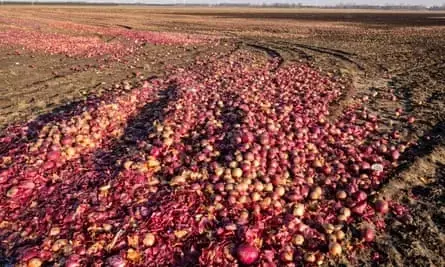Tackling the Global Food Waste Crisis: A Comprehensive Approach
Food waste has become a pressing global issue, with significant environmental, economic, and social implications. While traditional societies have long embraced a culture of minimizing waste, modern industrialized nations have struggled to curb the staggering amounts of food that end up in landfills or go unused. This article delves into the complexities of the food waste problem, exploring the root causes, the environmental impact, and the innovative solutions that are emerging to address this critical challenge.Transforming Attitudes: From Waste to Sustainability
The Contrast Between Traditional and Modern Societies
In traditional societies, the concept of food waste was virtually non-existent. Every edible part of an animal or plant was meticulously utilized, with members of these communities expressing outrage at the thought of intentionally discarding food. The Maasai cattle herding community in northern Tanzania, for instance, viewed wasting food as a grave offense, even worse than murder, as it could lead to multiple lives being impacted.However, the attitudes towards waste have shifted dramatically in industrialized nations. The United Nations Environment Programme (UNEP) estimates that around a third of the world's total food production is either wasted or lost, with the global average for household waste standing at 74 kilograms per person annually, regardless of income level.The Multifaceted Challenges of Food Waste
Food waste and loss occur at various stages of the supply chain, from the failure to harvest crops to the deterioration of products during transportation and storage. Additionally, the inflexible procurement requirements of buyers, such as supermarkets, can lead to farmers being left with surplus produce that they are unable to sell.Retailers also play a significant role in perpetuating food waste, with their practices of encouraging consumers to buy more than they need through bulk deals and pricing strategies. Supermarkets often prefer to discard unsold items at the end of the day rather than risk running out of stock, leading to significant waste of fresh foods.At the household level, food waste is often the result of poor meal planning, a lack of awareness about food storage and expiration dates, and a general disconnect from the value of food. Many people routinely cook more than they need, leading to the disposal of leftovers.The Environmental Impact of Food Waste
The environmental consequences of food waste are staggering. UNEP estimates that 8% to 10% of global greenhouse gas emissions are associated with food that is not consumed. In fact, if food loss and waste were a country, it would be the third-largest emitter of greenhouse gases globally.Beyond the climate impact, food waste also contributes to biodiversity loss, as vast tracts of land are dedicated to cultivation without ultimately feeding anyone. The scale of this problem is truly alarming, and it is clear that addressing food waste is crucial in the fight against climate change and environmental degradation.The Complexities of Packaging and Waste Reduction
The role of packaging in the food waste equation is a complex one. While improved packaging can extend the shelf life of certain products, reducing waste, it also comes with its own environmental burden in the form of increased resource consumption and greenhouse gas emissions.Recycling is often touted as a solution, but the reality is that the recycling infrastructure in many countries is inadequate, and the process itself has its own environmental impacts. Navigating the trade-offs between packaging, waste reduction, and environmental sustainability requires a nuanced and holistic approach.The Importance of Measurement and Accountability
Effective strategies to combat food waste require clear targets and robust measurement tools. However, in many countries, this basic requirement is not being met, hampering the ability to track progress and implement appropriate actions.The lack of mandatory food waste reporting for businesses in some regions further exacerbates the challenge, making it difficult to identify and address the root causes of the problem. Without a clear understanding of the scale and sources of food waste, efforts to reduce it can become disjointed and ineffective.The Danish Success Story and Its Limitations
The case of Denmark's remarkable 25% reduction in food waste between 2010 and 2015 offers valuable insights. This achievement was largely driven by the efforts of a single individual, Selina Juul, who launched a viral social media campaign and worked closely with the government and businesses to implement effective waste-reduction strategies.However, the Danish success story also highlights the limitations of such a personalized approach. Juul's charisma and the country's small size and environmental awareness were key factors in the campaign's success, making it challenging to replicate this model in larger and more diverse nations.The Need for Comprehensive, Collaborative Solutions
Addressing the global food waste crisis requires a multifaceted approach that involves stakeholders at all levels, from individuals and communities to governments and multinational corporations. Effective solutions must combine top-down policy initiatives, such as mandatory reporting and targeted incentives, with bottom-up grassroots efforts to raise awareness and drive behavioral change.Collaboration between the public and private sectors is crucial, as businesses must be engaged as partners in the solution rather than being perceived as adversaries. By aligning economic interests with sustainability goals, innovative approaches can be developed to prevent waste, redistribute surplus food, and promote a more circular food system.Embracing a Holistic Mindset Shift
Ultimately, tackling the food waste challenge requires a fundamental shift in societal attitudes and values. Just as social norms around issues like drink-driving and racism have evolved over time, the perception of food waste must also be transformed from an acceptable practice to a moral and environmental imperative.By making waste more visible and tangible, through measures such as regulation and public awareness campaigns, the social costs of excessive waste can be highlighted. This, in turn, can foster a collective sense of responsibility and a renewed appreciation for the value of food, empowering individuals, communities, and institutions to take meaningful action.The path to a world with significantly reduced food waste is complex, but the potential rewards are immense. By embracing a comprehensive, collaborative, and values-driven approach, we can work towards a more sustainable, equitable, and resilient food system that minimizes waste, maximizes resources, and ensures that no one goes hungry.










